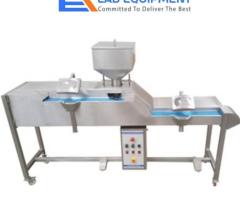Optimizing Tablet Disintegration: The Impact of Temperature and Compaction Pressure
300.00 ₹
Published date: 2025/03/04
- Location: Hyderabad, Telangana, India
Tablet disintegration is a crucial aspect of drug formulation that directly affects the bioavailability of active pharmaceutical ingredients (APIs). The ability of a tablet to break down efficiently in the gastrointestinal tract determines how quickly the drug is released and absorbed into the bloodstream. This article explores the impact of temperature and compaction pressure on tablet disintegration and how pharmaceutical formulators can optimize these factors for better therapeutic outcomes.
Understanding Tablet Disintegration
Disintegration is the process by which a tablet breaks into smaller particles upon contact with a liquid medium, usually within the stomach or intestines. This process is facilitated by disintegrants—key excipients that promote rapid tablet breakup. While traditional disintegrants like starch and microcrystalline cellulose have been widely used, modern formulations rely on superdisintegrants such as sodium starch glycolate (SSG) and crospovidone (XPVP) for enhanced performance.
Superdisintegrants work through mechanisms such as swelling, strain recovery, and wicking. When exposed to liquid, SSG swells, exerting pressure that causes the tablet to disintegrate. In contrast, XPVP relies on strain recovery, which facilitates rapid particle dispersion. However, the efficiency of these disintegrants is influenced by various factors, particularly temperature and compaction pressure.
Temperature: A Key Factor in Tablet Disintegration
Temperature plays a significant role in determining the disintegration rate of tablets. Higher temperatures generally accelerate disintegration by increasing the energy available to break inter-particle bonds. As a result, liquid penetration into the tablet matrix is enhanced, leading to faster activation of disintegrants.
Research indicates that raising the temperature of the disintegration medium from 37°C to 43°C can reduce disintegration time by 7–15%. Conversely, lowering the temperature to 33°C may increase disintegration time by 5–10%. This variation is particularly relevant in real-world scenarios, as stomach temperature fluctuates based on factors such as food intake and physiological conditions.
The Influence of Compaction Pressure
Compaction pressure during tablet manufacturing significantly affects tablet porosity and tensile strength. Higher compaction pressures result in densely packed tablets with strong inter-particle bonds, making them more resistant to disintegration. On the other hand, lower compaction pressures lead to more porous tablets that disintegrate faster.
However, the type of superdisintegrant used also influences how compaction pressure affects disintegration. For example, XPVP-based tablets may disintegrate faster at higher compaction pressures due to the strain recovery mechanism. In contrast, SSG-based tablets rely more on swelling, which may not be as effective when porosity is reduced.
Optimizing Tablet Formulations for Better Performance
To develop pharmaceutical tablets with optimal disintegration characteristics, formulators must carefully balance temperature sensitivity and compaction pressure. Understanding how these factors interact enables the design of tablets that provide consistent drug release and improved bioavailability.
Controlled Compaction Pressure: Manufacturers should optimize the compaction force to balance tablet strength and disintegration efficiency. Tablets must be strong enough to withstand handling yet porous enough for efficient liquid penetration.
Temperature-Resistant Formulations: Considering the natural fluctuations in body temperature, incorporating robust superdisintegrants can ensure consistent disintegration performance across different conditions.
Selection of the Right Superdisintegrant: The choice between SSG, XPVP, or other excipients should be based on the specific drug formulation and desired disintegration profile.
Final Thoughts
Understanding the impact of temperature and compaction pressure on tablet disintegration is crucial for optimizing drug formulations. By carefully adjusting these variables, pharmaceutical companies can enhance drug efficacy, ensuring better patient outcomes. As the industry continues to evolve, further research into disintegrant performance under varying conditions will pave the way for more effective and reliable drug delivery systems.
Understanding Tablet Disintegration
Disintegration is the process by which a tablet breaks into smaller particles upon contact with a liquid medium, usually within the stomach or intestines. This process is facilitated by disintegrants—key excipients that promote rapid tablet breakup. While traditional disintegrants like starch and microcrystalline cellulose have been widely used, modern formulations rely on superdisintegrants such as sodium starch glycolate (SSG) and crospovidone (XPVP) for enhanced performance.
Superdisintegrants work through mechanisms such as swelling, strain recovery, and wicking. When exposed to liquid, SSG swells, exerting pressure that causes the tablet to disintegrate. In contrast, XPVP relies on strain recovery, which facilitates rapid particle dispersion. However, the efficiency of these disintegrants is influenced by various factors, particularly temperature and compaction pressure.
Temperature: A Key Factor in Tablet Disintegration
Temperature plays a significant role in determining the disintegration rate of tablets. Higher temperatures generally accelerate disintegration by increasing the energy available to break inter-particle bonds. As a result, liquid penetration into the tablet matrix is enhanced, leading to faster activation of disintegrants.
Research indicates that raising the temperature of the disintegration medium from 37°C to 43°C can reduce disintegration time by 7–15%. Conversely, lowering the temperature to 33°C may increase disintegration time by 5–10%. This variation is particularly relevant in real-world scenarios, as stomach temperature fluctuates based on factors such as food intake and physiological conditions.
The Influence of Compaction Pressure
Compaction pressure during tablet manufacturing significantly affects tablet porosity and tensile strength. Higher compaction pressures result in densely packed tablets with strong inter-particle bonds, making them more resistant to disintegration. On the other hand, lower compaction pressures lead to more porous tablets that disintegrate faster.
However, the type of superdisintegrant used also influences how compaction pressure affects disintegration. For example, XPVP-based tablets may disintegrate faster at higher compaction pressures due to the strain recovery mechanism. In contrast, SSG-based tablets rely more on swelling, which may not be as effective when porosity is reduced.
Optimizing Tablet Formulations for Better Performance
To develop pharmaceutical tablets with optimal disintegration characteristics, formulators must carefully balance temperature sensitivity and compaction pressure. Understanding how these factors interact enables the design of tablets that provide consistent drug release and improved bioavailability.
Controlled Compaction Pressure: Manufacturers should optimize the compaction force to balance tablet strength and disintegration efficiency. Tablets must be strong enough to withstand handling yet porous enough for efficient liquid penetration.
Temperature-Resistant Formulations: Considering the natural fluctuations in body temperature, incorporating robust superdisintegrants can ensure consistent disintegration performance across different conditions.
Selection of the Right Superdisintegrant: The choice between SSG, XPVP, or other excipients should be based on the specific drug formulation and desired disintegration profile.
Final Thoughts
Understanding the impact of temperature and compaction pressure on tablet disintegration is crucial for optimizing drug formulations. By carefully adjusting these variables, pharmaceutical companies can enhance drug efficacy, ensuring better patient outcomes. As the industry continues to evolve, further research into disintegrant performance under varying conditions will pave the way for more effective and reliable drug delivery systems.
Related listings
-
 Best Pediatrician Clinic in Tirumalagiri: Comprehensive Child Care for Your Little One300.00 ₹Health - Beauty Hyderabad (Telangana) 2025/03/04When it comes to your child’s health, choosing the right pediatrician is of utmost importance. If you are searching for the best pediatrician clinic in Tirumalagiri, look no further! Our clinic is dedicated to providing top-quality healthcare for chi...
Best Pediatrician Clinic in Tirumalagiri: Comprehensive Child Care for Your Little One300.00 ₹Health - Beauty Hyderabad (Telangana) 2025/03/04When it comes to your child’s health, choosing the right pediatrician is of utmost importance. If you are searching for the best pediatrician clinic in Tirumalagiri, look no further! Our clinic is dedicated to providing top-quality healthcare for chi... -
 DolphinDental Clinic in Madinaguda | Dentist in Madinaguda300.00 ₹Health - Beauty Hyderabad (Telangana) 2025/03/04Top-Quality Dental Clinic in Madinaguda – Your Trusted Oral Health Partner Are you searching for the best dental clinic in Madinaguda? Look no further! At Dolphin Dental Clinic, we provide exceptional dental care tailored to meet the needs of every p...
DolphinDental Clinic in Madinaguda | Dentist in Madinaguda300.00 ₹Health - Beauty Hyderabad (Telangana) 2025/03/04Top-Quality Dental Clinic in Madinaguda – Your Trusted Oral Health Partner Are you searching for the best dental clinic in Madinaguda? Look no further! At Dolphin Dental Clinic, we provide exceptional dental care tailored to meet the needs of every p... -
 Where to Sell YourOld Kanchi Pattu Sar ees in Hyderabad – Top Buyers & Best Deals2500.00 ₹Health - Beauty Hyderabad (Telangana) 2025/03/04Kanchipuram Pattu sarees are timeless treasures, known for their exquisite craftsmanship, rich zari work, and luxurious silk. However, over time, many people wish to sell their old Kanchi Pattu sarees for various reasons, whether it's downsizing, upg...
Where to Sell YourOld Kanchi Pattu Sar ees in Hyderabad – Top Buyers & Best Deals2500.00 ₹Health - Beauty Hyderabad (Telangana) 2025/03/04Kanchipuram Pattu sarees are timeless treasures, known for their exquisite craftsmanship, rich zari work, and luxurious silk. However, over time, many people wish to sell their old Kanchi Pattu sarees for various reasons, whether it's downsizing, upg...




Comments
Leave your comment (spam and offensive messages will be removed)